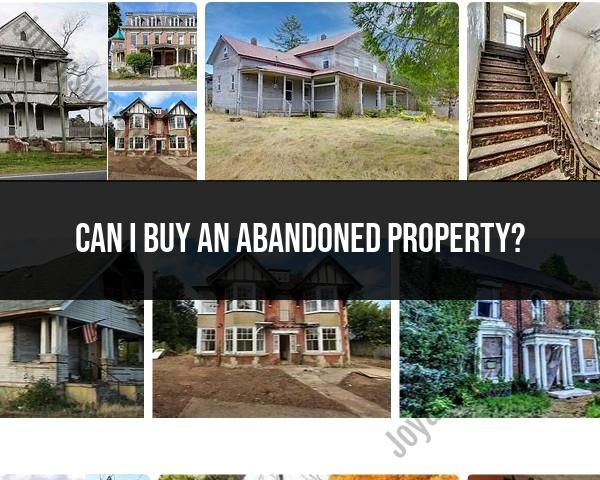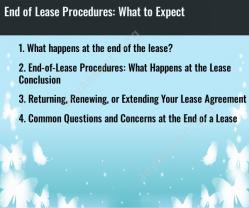Can I buy an abandoned property?
Yes, it is often possible to buy an abandoned property, but there are legal considerations and a specific process you should follow. The ability to purchase an abandoned property can vary by location, and you need to be aware of both the legal requirements and potential risks associated with abandoned properties. Here are some key considerations and steps to follow:
Locate the Property:First, you need to identify and locate the abandoned property you are interested in. You can do this through public records, online resources, or by working with a real estate agent or attorney who specializes in distressed properties.
Contact the Owner (If Known):If you can determine who the owner of the abandoned property is, attempt to contact them to express your interest in purchasing the property. They may be willing to sell or may provide information on the property's status.
Check Property Records:Research the property's history, including its ownership, any liens or outstanding taxes, and any pending legal issues. This information is typically available through the county clerk's office or assessor's office.
Visit the Property:Physically inspect the property, if possible, to assess its condition and whether it aligns with your intended use. Abandoned properties may require significant renovations or repairs.
Understand Legal Ownership:Ensure that the property is genuinely abandoned or vacant. It's important to distinguish between properties that are genuinely abandoned and those in the foreclosure process, in probate, or subject to other legal issues.
Research Property Laws:Familiarize yourself with property laws in your jurisdiction. Laws regarding abandoned properties, adverse possession, and squatter's rights can vary significantly by location.
Contact Local Authorities:Reach out to local government agencies or code enforcement offices to learn about any outstanding violations or issues related to the property.
Consider Adverse Possession Laws:In some cases, abandoned properties may become available for purchase through adverse possession, which involves occupying the property openly and continuously for a specified period as defined by local laws. Adverse possession laws differ from place to place, so consult with an attorney to understand your local regulations.
Tax Sales and Auctions:In some cases, abandoned properties may be sold at tax auctions if the owner has failed to pay property taxes. You can inquire about upcoming tax sales in your area.
Consult an Attorney or Real Estate Agent:It is highly advisable to work with a real estate attorney or a real estate agent experienced in handling distressed properties. They can guide you through the legal process and help ensure a smooth transaction.
Title Search and Title Insurance:Conduct a thorough title search to confirm the property's ownership status and any potential liens or encumbrances. Consider purchasing title insurance to protect your investment.
Negotiate the Purchase:Once you are satisfied with your due diligence, negotiate the purchase price with the owner or the relevant authority, if applicable.
Secure Financing:Arrange financing for the purchase, whether it's through a mortgage lender, personal funds, or other means.
Complete the Purchase:Follow the legal process in your jurisdiction to finalize the purchase, which typically includes signing a sales contract, obtaining any required permits, and transferring ownership through the appropriate legal channels.
Buying an abandoned property can be a complex process, and it's essential to be diligent, follow the legal procedures, and consult with professionals who can provide guidance. Additionally, remember that the condition and status of abandoned properties can vary widely, so assess the associated costs and risks before proceeding.
The Process of Buying an Abandoned Property
The process of buying an abandoned property can be complex and challenging. It is important to do your research and understand the legal and regulatory requirements involved before you start looking for properties. Here is a general overview of the steps involved:
Locate potential properties: This can be done by searching online listings, attending property auctions, or driving around neighborhoods and looking for signs of abandonment.
Verify the property's status: Once you have identified a potential property, you need to verify that it is actually abandoned. This can be done by checking with the local tax assessor's office or the county recorder's office.
Identify the owner: Once you have verified that the property is abandoned, you need to identify the owner. This can be done by checking property records or hiring a title company to do a title search.
Contact the owner: Once you have identified the owner, you need to contact them and express your interest in buying the property. This can be done by sending a letter, making a phone call, or visiting the owner in person.
Negotiate a purchase price: If the owner is interested in selling the property, you will need to negotiate a purchase price. This can be a complex process, as the property may be in poor condition and may have liens or other encumbrances on it.
Close on the property: Once you have reached an agreement with the owner, you will need to close on the property. This will involve hiring a real estate attorney to prepare the closing documents and transferring the property title to your name.
Legal and Regulatory Considerations for Abandoned Property Purchase
There are a number of legal and regulatory considerations that you need to be aware of when buying an abandoned property. These include:
Property taxes: You will be responsible for paying any outstanding property taxes on the property.
Liens and encumbrances: The property may have liens or other encumbrances on it, such as unpaid mortgages or mechanic's liens. These will need to be cleared before you can take ownership of the property.
Environmental hazards: The property may have environmental hazards, such as asbestos or lead paint. You will need to have the property inspected for hazards and remediate them before you can occupy the property.
Zoning and building codes: You will need to make sure that the property complies with all zoning and building codes. This may involve making repairs or renovations to the property.
Finding Abandoned Properties for Sale
There are a number of ways to find abandoned properties for sale. These include:
Online listings: There are a number of websites that list abandoned properties for sale.
Property auctions: Abandoned properties are often sold at property auctions.
Driving around neighborhoods: You can also find abandoned properties by driving around neighborhoods and looking for signs of abandonment, such as overgrown lawns, boarded-up windows, or multiple for sale signs.
Rehabilitating and Renovating Abandoned Properties
Abandoned properties are often in poor condition and will need to be rehabilitated and renovated before they can be occupied. This can be a costly and time-consuming process, but it can also be very rewarding.
Potential Challenges and Benefits of Abandoned Property Investment
There are a number of potential challenges and benefits to investing in abandoned properties.
Challenges:
Finding properties: It can be difficult to find abandoned properties that are for sale.
Legal and regulatory issues: There are a number of legal and regulatory issues that you need to be aware of when buying an abandoned property.
Rehabilitation and renovation costs: Rehabilitating and renovating an abandoned property can be costly.
Benefits:
Potential for profit: Abandoned properties can often be purchased at a discount, and they can be worth significantly more after they have been rehabilitated and renovated.
Satisfaction of restoring a property: Rehabilitating and renovating an abandoned property can be a very satisfying experience.
Contributing to the community: Rehabilitating and renovating an abandoned property can help to improve the surrounding community.
Investing in abandoned properties can be a risky proposition, but it can also be very rewarding. If you are considering investing in abandoned properties, it is important to do your research and understand the risks and potential rewards involved.












